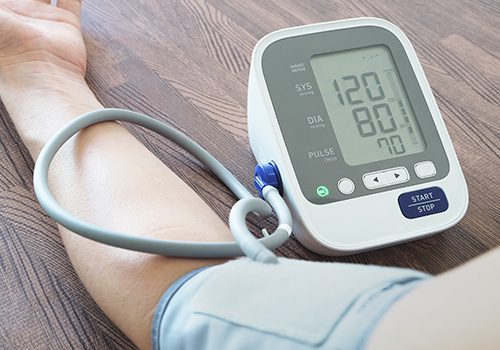[vc_row][vc_column][vc_column_text]Blood Pressure and your body
High blood pressure has many harmful effects on the body. It increases the risk of having a heart attack or stroke.
By taking control of your blood pressure you can make a positive step towards reducing your overall risk of developing cardiovascular disease.
Ireland has one of the highest incidence rates of Stroke and Coronary Artery Disease in Europe, with six in ten of all Irish adults having high blood pressure. High blood pressure can cause silent damage to the blood vessels and the heart. If left untreated the damage may progress and result in a stroke or a heart attack.
What is Blood Pressure?
Blood pressure is the force of blood against the walls of the arteries when the heart contracts. Everyone has blood pressure. While a certain amount of pressure is needed to keep the blood flowing, this pressure can increase if the blood meets resistance in the arteries. Blood flowing through the arteries at high pressure can damage artery walls. If this pressure is persistently high, this is called high blood pressure or “hypertension”.
High blood pressure is a sign that the heart and blood vessels are being overworked.
Blood pressure is recorded as two numbers
- The “systolic” pressure is the pressure exerted on the arteries when the heart is beating.
- The “diastolic” pressure is the pressure present in the arteries when the heart relaxes between beats.
Blood pressure is expressed as the systolic pressure “over” the diastolic pressure. For example, a blood pressure measurement of 120/80 is expressed as “120 over 80”.
How do I know if I have High Blood Pressure?
A consistent blood pressure reading of 140/90 mmHg or higher is considered high blood pressure. You may not know you have high blood pressure, as usually there are no warning signs or symptoms. The only way to know if your blood pressure is high, is to have it checked. Therefore, it is very important to have your blood pressure checked once a year
Initial assessment:
- Having your blood pressure measured is quick and easy, and can be done by your doctor or nurse.
- Blood pressure is measured using a special instrument called a sphygmomanometer. This involves a cuff being wrapped around your arm just above the elbow, which is then inflated. Automatic blood pressure monitors are commonly used. In these cases the blood pressure reading appears on a small screen.
- Blood pressure is just one of the risk factors for heart disease or stroke, therefore your doctor may decide to do some extra blood and urine tests to identify other risk factors that you may have.
Repeat assessment:
Most doctors will diagnose a person with high blood pressure on the basis of a number of readings. However sometimes your GP may recommend 24 hour blood pressure monitoring. If so:
- This monitor must be worn for 24 hours and will inflate and check your blood pressure every half hour.
- Your blood pressure will vary at different times of the day depending on your activity levels, therefore it is important to carry out your normal daily activities while wearing the monitor.
- This method of blood pressure monitoring is particularly good for patients who only experience high blood pressure when they visit the doctor’s surgery. This is called “white coat hypertension”. Blood pressure can rise when a person is nervous or anxious
Monitoring Blood Pressure at Home
Many people also like to monitor their blood pressure themselves using a home blood pressure monitor. The British & Irish Hypertension Society publishes the only independent, validated blood pressure monitors for home use, not governed by commercial interest. For a full list of validated blood pressure monitors, click here, or here is Croí’s short-list of recommended blood pressure monitors:
- A&D UA-705: Upper Arm
- A&D UA-704: Upper Arm
- Omron M2 Compact (HEM-7102-E): Upper Arm
- Omron M2 Basic (HEM-7116-E) (Derivative of M3-I (HEM-7051-E)): Upper Arm
- Omron M7 (HEM-780-E): Upper Arm
What causes High Blood Pressure?
In the majority of people there is no single clear cause of high blood pressure. However, there are a number of factors that contribute to high blood pressure. These include:
- Family history of high blood pressure.
- Age (as you grow older, blood pressure tends to rise).
- Being overweight.
- A high intake of sodium (salt) in the diet.
- Physical inactivity.
- A high intake of alcohol.
- Ethnic Origin: people from African-Caribbean and South Asian communities have a higher predisposition to developing high blood pressure.
In the remainder of people who don’t fit into the above category, high blood pressure can arise as a result of other diseases such as a kidney disease, disorders of the adrenal gland etc.
What should my Blood Pressure be?
It is very important to know the recommended target level for blood pressure.
Target Level Less than 140/90 mmHg*
If you have Diabetes, Heart Disease, Kidney Disease, or if you have had a Stroke your doctor may prescribe a lower target level.[/vc_column_text][/vc_column][/vc_row]
